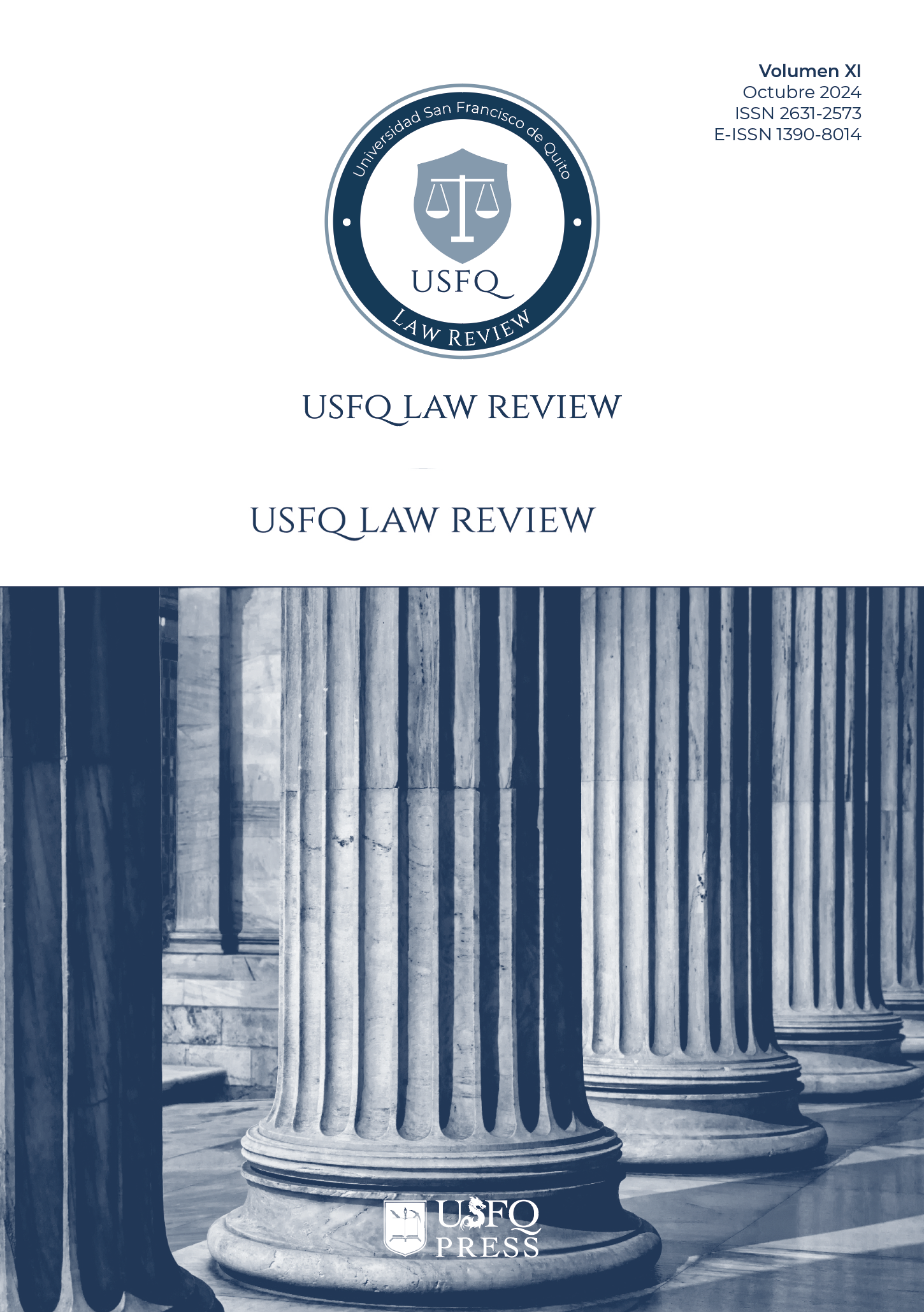Foundations, application, and future of legal regulation of digital sports betting platforms in Ecuador
DOI:
https://doi.org/10.18272/ulr.v11i2.3371Keywords:
Sports predictions, sports, consumer protection, sports betting, regulation, taxationAbstract
Business development aims to meet the economic needs of a population, but certain activities like sports predictions face debate due to potential negative impacts and its confusion it with gambling, which is prohibited in Ecuador. Despite having longstanding historical roots and now primarily operating through digital platforms, sports predictions should not be equated to gambling under Ecuadorian law. This distinction is crucial, especially following the 2011 referendum that banned gambling activities such as casinos and gaming halls. In Ecuador, sports predictions have emerged as a growing economic activity, recognized by the Law for the Strengthening of Family Economy, which established a single tax for operators.
The Office of the Attorney General has clarified that sports predictions, based on sports knowledge and analysis, do not constitute gambling under criminal law, thereby allowing for its regulation and operation under fiscal supervision. Internationally, while the European Union does not regulate gambling broadly, including sports predictions, countries like the United Kingdom or France have established specific legal frameworks, including the creation of regulatory bodies. In Latin America, Colombia has implemented a successful regulatory model with COLJUEGOS, overseeing and regulating gambling activities, including sports predictions, generating significant revenue allocated to public health.
In summary, sports predictions represent a legitimate form of economic activity in Ecuador, subject to specific regulations that clearly differentiate these practices from gambling. With appropriate legal frameworks and corresponding oversight, this industry can positively contribute to the local economy while safeguarding public interests and preventing negative impacts associated with irresponsible gambling.
Downloads
References
Acuerdo 5, Empresa Administradora del Monopolio Rentístico de los Juegos de Suerte y Azar [por medio del cual se define la naturaleza del pronóstico deportivo], Diario Oficial de Colombia 50814 del 18 de septiembre de 2018.
Benalcázar Sánchez, Juan. “La desproporcionalidad de la sanción en el delito de juego de azar en el código orgánico penal”. Tesis de grado, Universidad de las Américas, 2015. http://dspace.udla.edu.ec/handle/33000/4372.
Benítez, Nicanor. “Luchar contra las causas, no contra los efectos”. Boletín Ciudad Segura, n°. 43. (2011): 2-3. http://hdl.handle.net/10469/6475.
Bustillo, Pablo. “Machine learning aplicado a las cuotas en las apuestas deportivas”. Tesis de grado, Universidad de Barcelona / Universidad Politécnica de Cataluña, 2018. http://hdl.handle.net/2117/123942.
Cadena, Henry. “El derecho a la integridad psíquica y la seguridad jurídica en los pronósticos deportivos en la legislación ecuatoriana”. Tesis de grado, Universidad Regional Autónoma de los Andes, 2023. https://dspace.uniandes.edu.ec/handle/123456789/17420.
Caso 1-23-UE, Corte Constitucional del Ecuador, 16 de junio de 2023.
Centro de Capacitación Judicial Electoral. “Ecuador: referéndum-consulta popular 2011”. Nota Informativa del Tribunal Electoral, mayo 2011. https://www.te.gob.mx/ccje/Archivos/nota_info_ecuador.pdf.
Código Orgánico Integral Penal [COIP]. R. O. Suplemento 180 del 10 de febrero de 2014.
Empresa Administradora del Monopolio Rentístico de los Juegos de Suerte y Azar [por medio de la cual se define la naturaleza del pronóstico deportivo], Diario Oficial de Colombia 50814, 18 de septiembre de 2018.
Estrada, Mayra. “¿Es necesario regular?: análisis del marco legal de los juegos de azar y apuestas en el Perú”. Ius et Veritas 23, n°. 46. (julio de 2013): 350-61. https://revistas.pucp.edu.pe/index.php/iusetveritas/article/view/11975.
Grandas López, Andrea, y Diego Romero Murillo. “Corredor Empresarial S. A.”. Tesis de maestría, Universidad Externado de Colombia, 2019. https://doi.org/10.57998/bdigital.handle.001.2570.
Kaburakis, Anastasios. “European Union Law, Gambling, and Sport Betting. European Court of Justice Jurisprudence, Member States Case Law, and Policy” En Sports Betting: Law and Policy, editado por Anderson, Paul, Ian Blackshaw, Robert Siekmann, y Janwillem Soek. La Haya: T.M.C. Asser Press, 2011. https://doi.org/10.1007/978-90-6704-799-9_4.
Ley 643 de 2001 [por la cual se fija el régimen propio del monopolio rentístico de juegos de suerte y azar], Diario Oficial de Colombia 44.294 del 17 de enero de 2001.
Ley Orgánica para el Fortalecimiento de la Economía Familiar [LOFEF]. R. O. Suplemento 335 del 20 de junio de 2023.
Martínez-Santos, Raúl. “Juegos, reglas y azar: sobre la naturaleza de los juegos deportivos”. Retos, n.o 26. (Julio 2014): 143-8. https://doi.org/10.47197/retos.v0i26.34417.
Miers, David. “Implementing Great Britain’s Gambling Act 2005: The Gambling Commission and the Casino Question”. Gaming Law Review, n°. 10. (octubre de 2006): 472-81. http://doi.org/10.1089/glr.2006.10.472.
Ministerio de Hacienda de Colombia, Boletín 001 de 24 de enero de 2023.
Oficio 07017, Procuraduría General del Estado de 13 de diciembre de 2019.
Pérez Carcedo, Levi. “El mercado de apuestas deportivas”. En Alberto Palomar Olmedo, coordinador, Las apuestas deportivas, 13-33. Navarra: Thomson Reuters Aranzadi, 2010. http://hdl.handle.net/10651/13157.
Pérez Escobar, Germán, y Diego Velásquez Delgado. “Aproximación al fenómeno de las apuestas deportivas desde una óptica sociológica y econométrica: análisis de escenarios prospectivos del sector y modelos fácticos de inversión del capital en las plataformas de apuestas online”. Tesis de grado, Universidad Antonio Nariño, 2023. http://repositorio.uan.edu.co/handle/123456789/9319.
Resolución n°. NAC- DGERCGC24-00000029, Servicio de Rentas Internas de 31 de julio de 2024.
San Salvador del Valle, Roberto. “Ocio, juegos de azar y apuestas deportivas”. Documentos de Estudios de Ocio, n°. 40. (julio de 2010): 25-47. http://www.deusto-publicaciones.es/deusto/pdfs/ocio/ocio40.pdf.
Downloads
Published
How to Cite
License
Copyright (c) 2024 Mateo Seminario Vélez

This work is licensed under a Creative Commons Attribution-NonCommercial-ShareAlike 4.0 International License.
In relation to copy rights, authors publishing with USFQ Law Review know and accept its internal policies, including but not limited to:
1. Open Access Policy.
2. Authorship Policy.
3. Copyright Policy.
4. Pre-Publication Policy.
5. Post-Publication Policy.
6. Intellectual Property Protection Policy.
7. Digital Preservation Policy.


